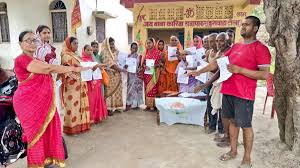Bihar Voter List Row Hearing LIVE: ‘Purging non-citizens from electoral rolls is prerogative of Home Ministry, not EC,’ says SC

New Delhi, July 10, 2025 — The Supreme Court, during a key hearing in the Bihar voter list case, clarified that the Ministry of Home Affairs (MHA) — not the Election Commission of India (ECI) — holds the power to remove non-citizens from the electoral rolls. This came as the court heard a plea alleging that foreign nationals had been added to voter lists in parts of Bihar.
The petitioner, a Bihar-based NGO, alleged that thousands of non-citizens were included in the rolls, especially in border districts. The NGO claimed this compromised the fairness of recent elections and demanded immediate action.
SC Clarifies: Citizenship Check Is Not EC’s Job
A bench headed by Chief Justice D.Y. Chandrachud made a clear distinction. The court stated that while the Election Commission ensures fair elections, it cannot decide who is a citizen.
“The Home Ministry decides citizenship. The Election Commission cannot take such action on its own,” the Chief Justice said.
This clarification puts the spotlight on the legal roles of different constitutional bodies. It may influence future voter verification exercises across India, especially in politically sensitive regions.
What the Petition Demanded
The petitioner claimed that voter rolls in Bihar included “ghost voters” and illegal immigrants. They urged the Supreme Court to direct the EC to remove such names and verify citizenship records with urgency.
The petition especially mentioned areas bordering Nepal and Bangladesh. The NGO alleged that many residents had voting IDs despite lacking citizenship documents.
EC Responds: We Follow What Government Provides
The Election Commission filed its reply and explained that it doesn’t check citizenship independently. Instead, it uses information from state and central agencies.
“We rely on data from District Magistrates and Home Department officials. We cannot check nationality on our own,” the EC said in court.
The EC added that it had already conducted pre-election roll revisions in Bihar. It assured the court that it followed routine protocols to maintain the accuracy of the lists.
SC’s Direction to Government and EC
While the court took the claims seriously, it warned against targeting groups without proof. It asked the Ministry of Home Affairs to explain what steps it currently takes to flag non-citizens in the electoral database.
The court also directed the Bihar state government to submit a response within two weeks. It emphasized the need for coordination between the MHA and the EC.
“Both institutions must work together without crossing constitutional lines,” the court said.
Political Reactions: Heated Yet Predictable
The ruling drew swift reactions. The ruling BJP-JDU alliance in Bihar welcomed the court’s observation. They had earlier raised concerns about voter list irregularities.
Opposition parties, however, sounded cautious. The RJD and Congress warned that the issue might be used to spread fear among specific communities.
“This could create panic among minorities. Citizenship is a sensitive matter and must not be politicized,” said RJD leader Manoj Jha.
Legal Experts: Landmark Clarification
Legal analysts said the court’s remarks clarified a long-debated issue. In recent years, several states have called for cleaning voter lists of ineligible names. This verdict now makes it clear who holds the authority to act.
“This decision reinforces legal boundaries. The EC can’t act beyond its scope. Only the Home Ministry can verify and remove non-citizens,” said constitutional expert Sanjay Hegde.
Next Steps: What Happens Now?
The Supreme Court will hear the case again on August 14, 2025. By then, the MHA and EC must submit a joint plan. The plan should explain how to detect and remove non-citizens lawfully without disrupting genuine voters.
The court also asked the petitioner to share specific examples of suspected illegal voters, including names and locations.
Conclusion
The Bihar voter list row has reignited debates about the integrity of India’s electoral process. While the court clarified roles, the challenge now lies in execution. Accurate voter lists are key to a functioning democracy. But protecting the rights of genuine voters is equally important. As this legal battle continues, the nation watches how its institutions maintain both fairness and constitutional balance.






